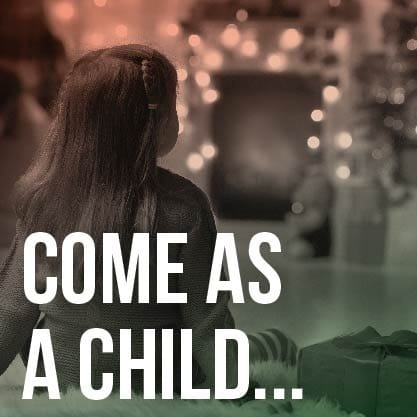…“Assuredly, I say to you, unless you are converted and become as little children, you will by no means enter the kingdom of heaven.” – Matthew 18:3
Something about the Christmas season makes us more inclined to recognize the child in us. One of the greatest human deceptions is that we are so mature we don’t need to continually acknowledge our child-likeness in the presence of the living God. This verse leads us to consider three encounters of Jesus with children, and how we are invited to come as a child to Him. It’s Jesus Himself who says, if you don’t, you’ll never enter into the Kingdom.
The Kingdom of God is more than a poetic idea; and the “Kingdom” is more than an interchangeable term for heaven or church-things. It’s not a temporary atmosphere of emotion or sentiment; it focuses on an order of life. It’s a place where the love of God rules, and the power of God is available.
Entering into the Kingdom is not only our new birth in Christ, but also our re-birth from season to season, as we let the Lord renew the child-likeness in us that leaves things under the Father’s judgment and chooses to move in His love, grace and mercy. Jesus is talking about becoming a child that enters into the circle of God’s will continually. The Father’s will is not suffocating or oppressive; it is liberating and releasing. The Kingdom also is a realm where there is a monarch who is ruling; a Kingdom in which His will prevails.
Except for child-likeness, we can never enter into or abide in that realm. You may have been born into the Kingdom as a child of God some years ago—or maybe today’s the day you’re going to come and begin your life in relationship to God through Jesus Christ. Irrespective of whether the birth has taken place already or it’s en route to taking place today, Jesus says the way to enter the Kingdom is to become child-like in our faith.
The purpose of stories in the Bible
There are profound lessons for us in the stories of the Bible. Bible stories are not just interesting sidelights to history. The Word of God is given to do three things: to teach (didactic), to represent (symbolic), and to breath life (prophetic).
Didactic means that every story of the Bible teaches us about history—the facts as they occurred.
Symbolic means that God has selected these stories by His Spirit in order that we might not only see within them a lesson, but also gain a representative understanding of concepts that will cause us to know how He feels and thinks.
Prophetic means that the Word is breathed by the Holy Spirit to come off the page into your life. The episode is more than a thing you know about; it’s a reality God breathes into you so that the Word becomes flesh in you.
The story of Jairus’ daughter
Come as a child to Jesus by seeing yourself as Jairus’ daughter, whom Jesus raised from the dead. (Mark 5:21-43)
Perhaps a person in your life has died, and with that, hope has died. There’s despair, a lingering grief that seems inescapable. You’ve lost the capacity to get re-geared or re-tooled. There are those for whom it seems too late. When things weren’t going the way you’d hoped or dreamed, you called on God to help, but it didn’t seem that He got there in time. Jairus was told when he went to get Jesus, “Your daughter is dead, why trouble the Teacher any further?” (v. 35).
The prophetic message of Jairus’ daughter is that situations that appear too dead and too late are not so if we’ll listen as a child. The Lord is calling to people today to rise up from the death of their situation (v. 41).
Don’t let the death dominate you; the living Lord has come into your presence. He is not simply issuing an abstract command requiring you to somehow struggle back to life. He breathes life. He is the essence of life. He is the resurrection and the life.
The story of the children who were rebuked by the disciples
Come as a child and let Jesus touch you with His blessings. (Matthew 19:13-15)
How many people have ever wanted to receive something of blessing, of opportunity, of acceptance and ended up being rejected or rebuffed? It could have happened last week or thirty years ago—but it still stings in your soul. As we come this Christmas, you need to come to Jesus for a touch from His hand to relieve you from the impact of rejection.
The question is, will you do it? We are so inclined to either remain wounded or become embittered by the violations of rejection. What if those who had brought the children to see Jesus had, at the first rebuff, decided to be wounded, irritated and angry, and not come to Him as He welcomed them?
We are all hurt, bruised and beaten. It’s not a matter of self-pity; life is loaded with bumps and snags. Come this Christmas as a child to Jesus and beyond whatever rejection may have happened, He will reach out His hand and bless you with a spirit of healing, liberty, wholeness and recovery beyond anything any humankind can do.
The story of the little boy who gave up his lunch
Come as a child, possessing unimagined possibilities. (John 6:9-12)
This little boy who brought his lunch was probably alone without his parents, otherwise he might not have offered his lunch to Jesus. It’s likely that he had just arrived. That he’s called a “lad” suggests that he could be anywhere from six to twelve years old. Why did he come? He wanted to hear Jesus.
We have no way of knowing whether the boy had seen Jesus on His prior visit to that region, had already been blessed by Him and now desired to see Him again. But we do know that he approached the disciples with his offering—nobody confiscated his lunch. It’s conceivable that the little boy recognized who Jesus was and perhaps felt a call on his own life by Him.
The evidence of the text is that Jesus welcomes the child who happily gives up his lunch, but the little boy had no idea what was about to happen to that lunch.
Jesus has the throng of thousands pray. As the Master begins to break the bread, it begins to multiply. He is the Creator-Redeemer. It is being created right there with this little bit to start. He breaks it and it keeps multiplying until all have been fed. I wonder if they didn’t tell the little kid when it was all over, “Sit down, you can have the leftovers.”
This Christmas, come as a child, possessing unimagined possibilities. It requires your surrender of what you have and are to Jesus for those unimagined possibilities to be realized. Cease gauging how much worship you’ll give to God, how much mercy, grace and forgiveness you’ll give to people. If you won’t surrender it all to Him, then His touch can’t come upon it to multiply it into what could be. Whatever’s died, He can resurrect. Wherever there are wounds, He’ll reach His hand to heal and bless. If you’ll surrender everything you have to Him, He will create unimagined possibilities.




